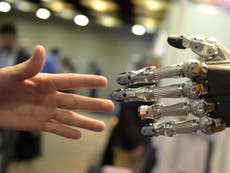We should be pleased that robots are taking over some of our old jobs
We should recognise that up to now it is the repetitive jobs that are being automated, not the ones that need ingenuity or creativity


Mark Carney knows how to illustrate economic trends through the use of creative language. And when he talks, people tend to listen.
“The massacre of the Dilberts” was how the governor of the Bank of England encapsulated the fear that middle-management jobs would be wiped out by automation – for people unfamiliar with American cartoon strips, Dilbert is a white collar office worker and the strip mocks the absurdities of office life.
In his native Canada this week, Carney made a number of points in a speech on automation. Most obviously, many office jobs done by people would be done by computers, a process that was already well advanced.
“When I look back 30 years ago, what I used to do in the City of London when I worked at an investment bank, probably about three-quarters of what I did is now done by machine,” he said.
People would have to retrain to get skills that would be useful, now that many repetitive jobs could be done by machines, and policymakers would have to “get a grip” on the problem.
“Marx and Engels may again become relevant,” he warned, if technology were to destroy jobs, cut wages and increase inequality.
It is a hugely important issue and Mark Carney deserves praise for giving it such a public airing.
But let’s put these – very real – fears in context.
One, there is no shortage of jobs in the developed world in reasonably well-run economies. Germany has unemployment down to 5.3 per cent, the lowest since unification in 1990. It also has the largest number of people employed ever: 44.59 million. The UK has the largest number of people employed and the lowest unemployment since the 1970s. The US unemployment rate is down to 4.1 per cent, a 17-year low. Some countries, Italy and Spain for example, have done much worse, but that is down to poor labour-market policies.
Two, are these new jobs as good as the old ones? It is a charge often made, but there is a danger of regarding the jobs of the past through a rosy prism. In the 1960s there were 500,000 people employed in coal mining in the UK. Was that such a great job? I can understand the camaraderie of it – I did a couple of times go down a mine then and caught a glimpse of that – but it was undoubtedly dangerous and unhealthy. There are many jobs now which are depressing and stressful, and doing something about that is a huge challenge. Anecdotally, we seem to be making a lot of white-collar jobs less enjoyable by excessive paperwork and regulation, but we should surely be able to fix that with a bit of common sense.
Three, we should recognise that up to now it is the repetitive jobs that are being automated, not the ones that need ingenuity or creativity. In his speech, Carney cites data entry as one of the jobs that has now been replaced by machines. That is surely positive: who enjoys data entry?
The question now is whether artificial intelligence will start to replace jobs that are not repetitive and do require an element of creativity. At the moment AI is quite specific in what it can do. Just a few days ago Mark Zuckerberg referred several times in his testimony to Congress that Facebook was using AI to monitor what was going out on its platform, the idea being to stop undesirable stuff being spread. But that, as far as I understand it, is doing intellectual drudge work, not cutting-edge intelligence. You use AI because you could not cope with the data without it. But it only does what it has been told to do.
Finally, I don’t think we should be frightened about not knowing what the new jobs will be. Facebook is a great example. It employs more than 25,000 people. In 2004 it employed seven. In 2003 it did not exist; it was just an idea in the head of a sophomore at Harvard. Somewhere right now, perhaps in a dorm in a university, there will be people who are creating an entirely new product, service or indeed industry that will be employing millions of people in 15 years’ time. These jobs are not bad ones by the way. Last week Google revealed that the average salary of its UK workforce was £200,000.
There will be losers. Carney is quite right about that. It is reasonable that the pace of change should be buffered so that people have time to adapt. It is reasonable too for the winners to pay part of those winnings, through the tax system, to support people who are displaced. It is reasonable however that people should accept that their jobs and functions will change, maybe several times, through their lifetimes, and that they should adapt to that.
And as for Marx and Engels? Well, here are two things we know with absolute certainty. One is that the application of their economic ideas in Russia broke down after a 70-year experiment. The other is that China’s great burst of growth started only after the command economy of Chairman Mao started to be dismantled. I understand the appeal of their ideas, but their application during the last century turned out to be a catastrophe.


Join our commenting forum
Join thought-provoking conversations, follow other Independent readers and see their replies